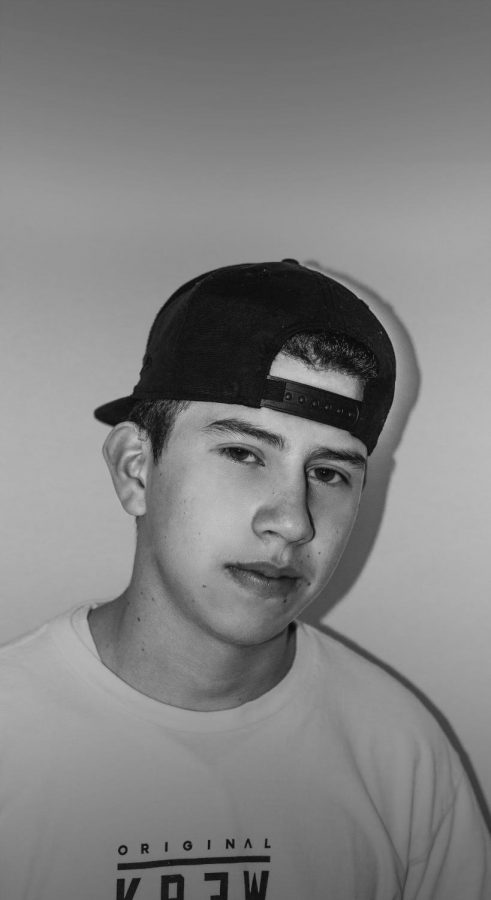Walter’s journey
The story of a boy who came to America alone
Sitting in the back of the car with no daylight at all, Walter Alfaro ‘21 felt terrified at the idea of getting caught by the police. The windows were rolled up, and he was hidden away from the outside eye. Alfaro was immigrating on his own at the age of thirteen from El Salvador.
“The whole story started when I was two years old. My little brother had died from cancer, and my mom decided to come here to the United States to give me a better future,” Alfaro said.
He soon found all of his belongings packed and moved to his grandparents’ house. Surrounded by piles of boxes, his parents gave him a heartfelt goodbye, but two-year-old Alfaro didn’t know that they were leaving for good.
Alfaro didn’t see his parents for the next eleven years of his life. His grandparents became his new home. However, after some time that was no longer possible.
“My grandparents were too old to take care of me,” he said. “So, I decided to come here.”
He packed what he could take on foot and headed towards America.
His grandparents didn’t want him going all alone, so they hired a Coyote. It cost them $12,000 just to have someone who knew how to immigrate to the United States without getting caught.
His parents had no knowledge of him immigrating to the U.S. “My dad didn’t even know that I was coming here, I didn’t even talk to him in those [eleven] years to the time I got here,” Alfaro said.
The journey began, and Alfaro and the Coyote set off on foot for the U.S.. From then on, he would travel 2,679 miles to his new future.
Hitching the occasional ride with a passing car, the two often found themselves huddled in the back trying to stay out of sight and out of mind. “We were in cars, but we didn’t really know where we were,” he said.
The moment they set foot on Mexican soil, Alfaro knew that he had made it halfway through his journey.
They walked miles and miles, surrounded by the Mexican terrain. Soon they found themselves in a desert, abandoned with dirt and cacti, with the fear of knowing that the only people who knew vaguely where he was lived hundreds of miles away.
Then, real panic hit them. The pair soon came to the realization that they were lost somewhere in the Mexican desert.
“We were lost in the desert for like a week and no one knew,” Alfaro said.
After days of aimlessly roaming around the dusty mountains and fields in stifling heat, they found their way out and headed on their way towards Northern Mexico.
Back on track, the two hitched more rides and walked more miles. Again.
Now getting closer to the border, Alfaro and the Coyote neared a large, running river. It occurred to them that they would have to cross it in order to reach their final destination.
They jumped in, immediately frozen in the ice-cold water. Fear flashed across Alfaro’s face as he took in the risks of swimming across a large river.
He was forced to settle that fear and continue his trek. Cautiously, he took his first stroke across the river.
When he got across the river, it was time for a goodbye.
Alfaro soon found himself giving a warm hug to the person who had guided him on his journey across two different countries. He said goodbye to the Coyote.
He was now all alone, continuing the rest of the way to the border by himself.
Alfaro then found himself at the border between Mexico and the U.S., talking to immigration services.
“It took me about six months because when immigration got me, I didn’t have the contacts for my mom and all that, so it was really hard to locate her when she was here in the United States,” he said.
After jumping hurdle after hurdle of bureaucracy, Alfaro reached that sweet moment he’d been waiting for all those months and years. He was reunited with his family.
However, this is only the beginning of Alfaro’s journey.
Once he was in the U.S. with his family, Alfaro found himself facing many different obstacles.
“He still had to learn a lot of words. He had limited English proficiency,” Language Arts and ELD teacher Ms. Connie Williams said. “Reading and writing and listening to his teachers I think was really hard for him at the beginning.”
But language wasn’t the only difference.
Alfaro immediately noticed the cultural differences between the U.S. and El Salvador. “We only have two religions, Catholic and Christianity,” Alfaro said. “They’re just divided into two, and they choose like multiple cultures.”
In spite of El Salvador and the U.S. being different, the kindness of the people of Monarch helps him adapt easier to the environment here. “Everyone here in this school will help you with anything. They’re super kind,” he said. “You feel comfortable in this school. You don’t feel like you’re left out.”
Alfaro worries that immigration to America is even harder now than it was when he made his journey. “With what’s going on with the president and all that, it’s super hard to even cross the border,” he said.
But he is thinking about his future constantly with all of the regulations now. “I just thought about my future how I wanted it to be when I got my kids, like, I wanted to have this much money, my own house, my own family,” he said. After that, he knew that he had made the right choice.
“My life over there wasn’t anything until I got here,” he said.































